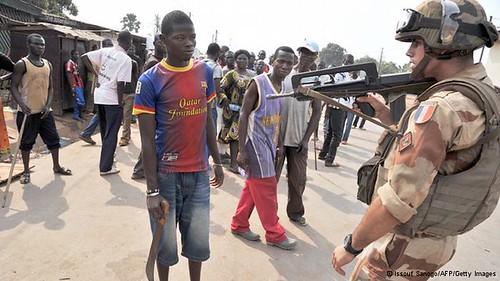
French troops holds gun against civilians in the Central African Republic. The country may be occupied by another contingent of EU soldiers., a photo by Pan-African News Wire File Photos on Flickr.
Planned EU mission is not enough for Central Africans
The reaction of the Central African Republic to the EU force planned for the crisis-stricken country has been muted. The 600 additional soldiers can hardly be enough to restore order.
The decision of the UN Security Council to authorize the deployment of a European intervention force in the Central African Republic has received a lukewarm response.
Under the resolution, up to 600 European soldiers are to restore order in the capital Bangui and guarantee the safety of the population, through the use of force, if necessary.
The mission, under the name of EUFOR RCA (European Union Force, Central African Republic), is to bolster the 1,600 French soldiers of Operation Sangaris and the 4,400 troops of the African intervention force MISCA already in the country. A mandate of up to six months has been approved. It is still unclear when the deployment will begin and which EU member states will participate. Alongside Mali, Somalia and the Horn of Africa, this is now the fourth joint mission of the European Union in Africa.
Interim President Samba Panza expects more help from the international community
Germany does not want to dispatch troops, but could secure air transport to neighboring countries. The UN Security Council on Tuesday (28.01.2014) also called on the interim government in Bangui to hold elections as soon as possible.
Observers, however, doubt that the planned military mission will be sufficient to stop the violence that has been escalating for months in the Central African Republic. "We need additional troops," Virginie Dero, who heads a human rights organization in the country, warned in an interview with Deutsche Welle.
Especially outside the capital, the security situation was still catastrophic, she said.
"Take the village of Kabou 600 kilometers (373 miles) north of Bangui, for example: its inhabitants are still being victimized by the armed groups, that is to say Seleka as well as anti-balaka." The former has a predominantly Muslim base, the latter's base comprises mostly Christians. "Both are holding the population of Kabou hostage," Dero said.
UN peacekeeping mission soon?
In an interview with DW, the Central African Republic's interim president, Catherine Samba Panza, welcomed the European intervention but indicated that she expected more support from the international community. "It may not be enough, but it is a big help," Samba Panza said.
The president also drew attention to the alarming security situation, both in Bangui and in the interior of the country. She hopes that the African mission MISCA will be expanded into a UN peacekeeping operation with several thousand additional troops. The UN estimates that at least 10,000 soldiers would be needed to restore security in the country.
Samba Panza is 'resisting massive pressure'
UN Secretary-General Ban Ki-moon, however, has not yet held out the prospect of such a peacekeeping mission. For the moment, he has appealed to the African states to increase their military and financial support for the crisis-stricken country.
Following an African Union (AU) summit in the Ethiopian capital Addis Ababa, a donor conference for countries in crisis, such as the Central African Republic, will be held on Saturday (01.02.2014).
But interim President Samba Panza cannot participate in the AU summit officially. The membership of the Central African Republic has been suspended since the coup staged by Seleka rebels in March of last year. It could be possible that Samba Panza will report on the situation in the country as a guest of the summit, said AU Commission chief Nkosazana Dlamini-Zuma.
The militias are exerting massive pressure on the government
"I don't know whether that's what will happen, but they will not participate in the summit until the Central African Republic has a democratically elected government," she said.
After months of chaos, the Central African Republic at least has a government again. On Monday (27.01.2014), interim Prime Minister Andre Nzapayeke had presented his cabinet. That was good news, said Thierry Vircoulon, an expert on Africa with the International Crisis Group. "One can see that President Samba Panza is asserting herself and is resisting massive anti-balaka and Seleka pressure." Of the 20 ministers, three are tied to the Muslim dominated Seleka rebels, while another three have links to the mostly Christian anti-balaka militia.
DW.DE
No comments:
Post a Comment